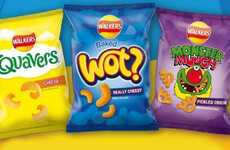
Who? Is Upset
Did you know you're supposed to be 16 to look at junk food ads? That's right! After pulling ads from TV that promote junkfood, companies like PepsiCo, Nestlé and, the mother of all obesity influences, McDonald's, took their marketing online, directly targeting children and teens. They're taking their unhealthy, virtual campaigns to sites like MySpace, YouTube and Bebo.
Since there's a ban on junk food ads targeting children under 16, websites must ask if they children are of legal viewing age, like liquor sites do.
"In December last year an alliance of food companies including Coca-Cola, Nestlé, Mars and Burger King signed an EU pledge to stop marketing junk food to children under 12 years old by the end of this year," the Guardian explains.
Which? is very upset because it's incredibly easy for young, impressionable minds to lie about their age online. Since the ban was implemented, a lot of junk food companies are using the web to target youth, including through interactive games.
Since there's a ban on junk food ads targeting children under 16, websites must ask if they children are of legal viewing age, like liquor sites do.
"In December last year an alliance of food companies including Coca-Cola, Nestlé, Mars and Burger King signed an EU pledge to stop marketing junk food to children under 12 years old by the end of this year," the Guardian explains.
Which? is very upset because it's incredibly easy for young, impressionable minds to lie about their age online. Since the ban was implemented, a lot of junk food companies are using the web to target youth, including through interactive games.
Trend Themes
1. Online Marketing Targeting Children - The rise of online platforms has allowed junk food companies to directly target children and teens with unhealthy food ads, raising concerns about their impact on youth eating habits.
2. Age Verification on Websites - With the implementation of bans on junk food ads targeting children, there is an opportunity for innovative solutions to effectively verify the age of online users to ensure compliance with regulations.
3. Shift From TV to Digital Advertising - As junk food companies face restrictions on TV advertising, they are shifting their marketing efforts towards digital platforms, presenting opportunities for disruptive innovation in the digital advertising space.
Industry Implications
1. Food and Beverage - The food and beverage industry needs to address the ethical issues surrounding junk food advertising targeted at children and explore healthier advertising strategies to promote nutrition and well-being among youth.
2. Digital Advertising - The digital advertising industry can leverage technological advancements and creative solutions to develop effective age verification systems and promote responsible advertising practices online.
3. Child Protection and Online Safety - The child protection and online safety industry has an opportunity to develop improved age verification tools and educational programs to protect children from harmful junk food marketing and ensure a safe online environment.
3.2
Score
Popularity
Activity
Freshness























